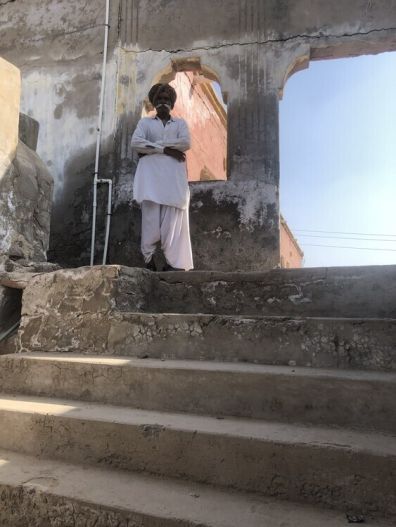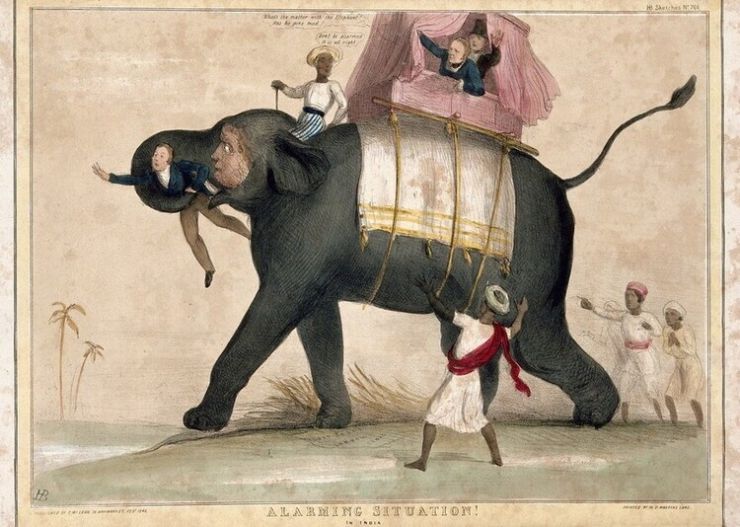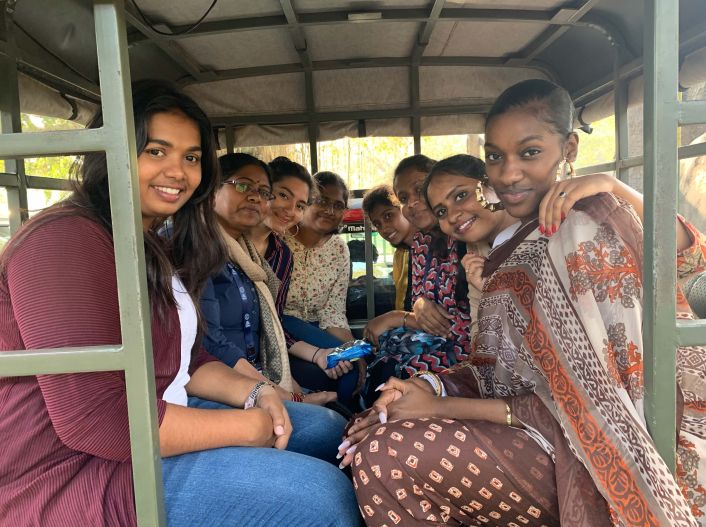South Asia Program
Crafting the Empire’s Echo: Design, Labor, and Politics in Contemporary India

March 2, 2026
12:15 pm
Uris Hall, G08
Talk by Llerena Guiu Searle (Anthropology, University of Rochester)
In order to build a more just world order, philosopher Olúfémi Táíwo argues that we must contend with the fact that our current social order builds on relations of colonialism that did not end with colonial independence in the 1940s-1960s. Slavery, colonialism, and racial capitalism have created what he calls the “Global Racial Empire” which accumulates advantages and disadvantages, harms and capabilities unevenly (2022). How might we understand “design” as a set of practices that operates within such a world system? Drawing on eight months of ethnographic fieldwork with furniture and interior designers in India, this talk examines the ways in which designers navigate capitalist markets that continue to be haunted by colonialism. On the one hand, creative experts shaping elite Indian homes describe design as an anti-colonial project, poised to free India from tastes, fashions, and products from abroad. On the other, designers navigate hierarchies of values set by global markets, including demand for exotic, uniquely “Indian” products. Furniture and interior production also relies on production methods still defined through neocolonial discourses of “crafts difference” (McGowan 2009) and on caste and class dynamics that legitimize labor exploitation. By investigating how these unseen forces – histories, values, and ideologies – structure design practice in India, this paper contributes to our understanding of the politics of the creative industries and their imbrication in “Global Racial Empire.”
Llerena Guiu Searle is an Associate Professor of Anthropology and of Visual & Cultural Studies at the University of Rochester, where she also co-edits the Lewis Henry Morgan Lecture Series. She is the author of Landscapes of Accumulation: Real Estate and the Neoliberal Imagination in Contemporary India (University of Chicago Press, 2016). Her research examines capitalism and the production of the built environment in urban India.
Additional Information
Program
Einaudi Center for International Studies
South Asia Program
Xi Risks Global Blowback If China Cuts Off Rare Earths for Japan

Allen Carlson, EAP/SAP
Allen Carlson, associate professor of government at Cornell University, comments on the risks China faces in alienating trading partners by leveraging rare earth exports.
Additional Information
China and Japan Relations ‘on Knife’s Edge’ Over Taiwan. So What Happens Now?

Allen Carlson, EAP/SAP
Allen Carlson, associate professor of government at Cornell University, provides expert analysis on the diplomatic crisis between China and Japan regarding Taiwan.
Additional Information
The Growing Problem with China’s Unreliable Numbers

Eswar Prasad, SAP
Eswar Prasad, senior professor of international trade policy, critiques the opacity and lack of transparency in China’s economic data.
Additional Information
Japan Warns Citizens in China About Safety as Diplomatic Crisis Deepens

Allen Carlson, EAP/SAP
Allen Carlson, a Cornell University expert on China's foreign policy, provided analysis on the worsening tensions between Japan and China.
Additional Information
Where the Ghosts of War Sleep: Enemy Property and the Ruins of 1971 in Pakistan

February 2, 2026
12:15 pm
Uris Hall, G08
Talk by Sadia Mahmood, South Asia Program, Cornell University
Mainstream historiography on South Asia has largely overlooked the afterlives of the colonial Enemy Property regime in postcolonial India, Pakistan, and Bangladesh. Drawing on archival records from Pakistan and India, as well as oral accounts from the Thar borderlands of Sindh, this talk traces how “enemy property” was produced, contested, and redistributed in early postcolonial South Asia. I situate Pakistan’s practices of seizing and reallocating enemy-owned assets within a longer international legal genealogy that emerged during World Wars I and II, when the confiscation of enemy property became a routine instrument of wartime governance. Transplanted into British India, this legal and administrative apparatus continued to shape Pakistan’s bureaucratic imagination during the 1965 and 1971 Indo-Pak wars. I argue that the category of enemy property migrated from a European imperial wartime technology to a postcolonial mode of governing minorities in South Asia, often blurring the distinction between wartime enemies and religious communities deemed politically suspect. In the Thar borderlands, the ruins of officially classified “enemy properties” function not only as material remnants but also as markers of social and emotional vulnerability through which local populations continue to navigate their dispossession.
Sadia Mahmood is an Assistant Professor at Quaid-e-Azam University, Pakistan, and a Visiting Scholar at the South Asia Program, Cornell University. Her work examines the making of postcolonial religious minorities, the histories of caste-oppressed communities, and state-making in Pakistan. Her research centers on the desert borderlands of Tharparkar, where memories of the 1971 Indo-Pak war continue to shape collective memory and everyday life. She works with Pakistan’s diverse Hindu and Sikh communities in Sindh and Punjab provinces. Her articles have appeared in South Asia: Journal of South Asian Studies (2024), where she published “The Long Migration: Revisiting the Postcolonial Minority/Refugee Crisis and Governance in East Pakistan,” and in The Indian Economic & Social History Review (2023), where she published “Untouchability, Caste, and the Electorate: Revisiting Legacies of the Poona Pact in Pakistan.” She also has forthcoming contributions, including “Historical Lines in the Dunes: Tharparkar,” in the Handbook of Sindhi Studies (Routledge).
Additional Information
Program
Einaudi Center for International Studies
South Asia Program
The Birth of Indian Liberalism

April 20, 2026
12:15 pm
Uris Hall, G08
Talk by Rahul Sagar (Political Science, NYU Abu Dhabi)
Letters to an Indian Raja (1891) was the first work of political theory to be published in modern India. It advised Maharajas to introduce liberal values and constitutional government in the self-governing Native States. Such reform would, it argued, make Indians freer and happier than they were in British India, and thus allow Maharajas to credibly challenge colonial rule. The rediscovery of this long-lost text overturns the long-held belief that Indian liberals merely borrowed their ideas from Britain and were eager to collaborate with the British. On the contrary, it reveals that they sought to make the Native States less vulnerable to both domineering Britons and despotic Maharajas—and that they were the first to discern how difficult it is to uphold liberal values in multicultural societies.
Rahul Sagar is a Global Network Associate Professor at NYU Abu Dhabi. His most recent books include The Progressive Maharaja: Sir Madhava Rao’s Hints on the Art and Science of Government (Oxford University Press, 2022) and To Raise A Fallen People: The Nineteenth-Century Origins of Indian Views on International Politics (Columbia University Press, 2022). He received his BA from Oxford and his PhD from Harvard and has previously served on the faculty at Princeton and NUS.
Additional Information
Program
Einaudi Center for International Studies
South Asia Program
Foreign Language and Area Studies Summer Fellowships

Details
Achieve fluency in a language of South Asia with the help of a Foreign Language and Area Studies (FLAS) summer fellowship. You’ll gain valuable knowledge about cultures and countries in which your language is commonly used, while developing skills in a language critical to the needs of the United States.
Awards must be used for summer 2026 intensive language study.
Deadline
- Apply by February 18, 2026 for summer 2026 language study.
Amount
- $3,500 stipend, plus fees and tuition allowance of up to $5,000, and possible travel support up to $1,000.
Eligibility
Graduate and undergraduate students are eligible. You must fulfill the following requirements:
- Be a citizen or permanent resident of the United States.
- Complete a FAFSA prior to the FLAS deadline.
- Agree to enroll in a summer 2026 intensive language program.
To be a successful applicant, you need to show potential for high academic achievement and demonstrate that you meet the necessary language training requirements. (Lowest priority will be given to a candidate who is a native speaker of the language for which an award is sought.)
How to Apply
In your application, you will be asked to provide information on your proposed study location. You must identify your preferred program(s).
We recommend the following summer intensive language programs, although we will consider any programs—domestic or overseas—that meet the minimum requirements.
- South Asia Summer Language Institute (SASLI), virtual through University of Wisconsin-Madison, offering Bangla, Dari, Gujarati, Hindi, Marathi, Nepali, Pashto, Punjabi, Sinhala, Tamil, Tibetan, and Urdu
- Middle Eastern and Mediterranean Language Institute (MEDLI), virtual through University of Wisconsin-Madison, offering Persian
- American Institute for Indian Studies (AIIS), in-person at various locations in India, offering Bengali, Gujarati, Hindi, Kannada, Malayalam, Marathi, Persian, Punjabi, Oriya, Tamil, Telugu, Tibetan, and Urdu
- South Asia Institute (SAI), virtual through University of Texas at Austin, offering Kannada, Malayalam, and Telugu
Your program must be at least six weeks in duration and offer at least 120 student contact hours. Please indicate the language level you intend to study during the summer 2026 award period.
Requirements
Additional Information
World in Focus: Gaza–Israel Conflict: Regional and International Impacts

November 11, 2025
4:00 pm
Uris Hall, G08
Join Einaudi Center experts for World in Focus Talks on global events in the news and on your mind. Our faculty's research and policy insights put the world in focus.
This year we’re hosting informal campus discussions on many Tuesday afternoons. This week’s topic:
The Gaza–Israel conflict escalated dramatically in October 2023, following Hamas's attack on Israel and Israel's subsequent military campaign in Gaza. After intense fighting that caused massive Palestinian casualties and displacement, a ceasefire and the outline of a peace agreement have been announced. These events will have far-reaching consequences for the region and the world: heightening political and security tensions in the Middle East, disrupting international humanitarian and legal systems, and straining international relations.
How is the Gaza–Israel conflict transforming the Middle East and challenging the international order?
***
Featured Speakers
Sandra Babcock (SEAP) | Law SchoolAlexandra Blackman (SWANA) | GovernmentEsam Boraey (PACS, Migrations) | GovernmentPeter Katzenstein (IES, PACS) | GovernmentJoseph Margulies (PACS) | GovernmentJake Silver | Near Eastern StudiesChantal Thomas (IAD) | Law School
***
Conversations Matter at Einaudi
This conversation is hosted by the Mario Einaudi Center for International Studies and its regional and thematic programs. Find out what's in store for students at Einaudi!
Additional Information
Program
Einaudi Center for International Studies
Reppy Institute for Peace and Conflict Studies
East Asia Program
Southeast Asia Program
Latin American and Caribbean Studies
Institute for African Development
Institute for European Studies
South Asia Program
Migrations Program
Southwest Asia and North Africa Program
Einaudi Kicks Off Yearlong Conversation on Foreign Aid
Lund Debate 2025
Undergraduate Global Scholars joined debaters to discuss “Is (Cutting) International Aid Good?”
For decades, international aid mainly flew under the radar of public opinion. Politicians from across the ideological spectrum lauded programs that saved lives, nurtured democracy, and promoted American values and interests. Except during wars and natural disasters, aid was rarely in the news.
That changed on January 20, 2025, when President Donald J. Trump issued an Inauguration Day executive order freezing all U.S. foreign assistance. Within weeks, Secretary of State Marco Rubio closed the headquarters of the U.S. Agency for International Development (USAID) and canceled 83% of the agency’s programs. Suddenly, foreign aid was at the center of an intense debate over national priorities and America’s place in the world.
January 20 was also the day that political scientist Ellen Lust arrived at Cornell to direct the Mario Einaudi Center for International Studies as the John S. Knight Professor of International Studies. One of her first actions was selecting a theme to guide the center’s programming and provide a focus for its Undergraduate Global Scholars for the 2025–26 academic year.
Lust, who is also a professor in the Cornell Jeb E. Brooks School of Public Policy and the Department of Government in the College of Arts and Sciences, chose “Is (Cutting) International Aid Good?” She said she meant the simple, yes-or-no question to be provocative at a university where “everyone understands how complex these issues really are.”
“We have faculty, students, and staff engaged in food security, agriculture, development, public health, nutrition, education, economics, international relations, area studies, and so many other fields,” Lust said. “My hope was that this could provide an opportunity for us all to put our heads together and think about what can be done in the future.”
Lust recruited international development specialist Paul Kaiser to lead the conversation as the Einaudi Center’s practitioner in residence. Kaiser has worked on public policy and education reform in sub-Saharan Africa, South and Southeast Asia, and the Pacific Islands, with agencies including USAID, the Millennium Challenge Corporation, and the World Bank.
“There have always been legitimate questions about aid dependency and corruption and the effectiveness of aid, but we’re facing a much more existential question, which is should there be any aid at all?”
“For me, aid starts off as a moral issue, but it's also an economic issue, it's a political issue, it's a social issue,” Kaiser said. “There have always been legitimate questions about aid dependency and corruption and the effectiveness of aid, but we’re facing a much more existential question, which is should there be any aid at all?”
That question was on the table at Einaudi’s Lund Critical Debate, which Kaiser moderated on October 22 in a packed Lewis Auditorium in Goldwin Smith Hall. The debaters were Cornell faculty members Chris Barrett, an agricultural economist and food policy expert, and Muna Ndulo, an expert in international law and governance.
“We need more, not less aid,” argued Barrett, the Stephen B. and Janice G. Ashley Professor of Applied Economics and Management in the Dyson School of Applied Economics and Management and a professor in the Cornell Brooks School of Public Policy. “We need it for moral reasons, for security reasons, and for economic reasons. But it needs to be fundamentally different than it has been in the past.”
Specifically, he said, “we need less bilateral aid—that is, government-to-government aid to support country-specific things—and we need far more aid for what some of us term ‘international public goods’—for things that cut across the global community.”
“We need more, not less aid. We need it for moral reasons, for security reasons, and for economic reasons. But it needs to be fundamentally different than it has been in the past.”
Those include agricultural and biomedical research, infectious disease monitoring and prevention, emergency response, and climate change mitigation. “These are things that we underinvest in massively” despite their high long-term economic returns, Barrett said. Most are better delivered by multilateral agencies and organizations than by individual governments, he said.
Ndulo, the William Nelson Cromwell Professor of International and Comparative Law at Cornell Law School, agreed that aid can be helpful and sometimes essential, but he said it can also do damage. “A constant feature in the field of development is the firm belief that low-income countries will always be poor and desperately in need of foreign assistance,” he said. “This mentality shapes the sorts of solutions that get fostered in those countries.”
Ndulo and Barrett both observed that aid often prioritizes donor countries’ interests over those of the recipients. Increasingly, Ndulo said, donors are conditioning aid on recipients’ willingness to support their foreign policy objectives. Overall, Ndulo said, aid has less impact than international trade, foreign direct investment, or remittances from people working abroad.
“If we focus more on fairer ways of trading,” he said, “we might not need as much aid.”
The Future of Aid
Rethinking the future of aid is the assignment for the 15 Undergraduate Global Scholars selected by the Einaudi Center in October. Over the course of the year, they will meet with experts, conduct research, and take part in discussions and events.
“For me, it’s personal,” said Sarvesh Prabhu ’28, who studies entomology and environmental sustainability in the College of Agriculture and Life Sciences. As a teenager, Prabhu worked at an international agricultural research center in his native India. He could see how important agriculture was to the nation’s development, but he also saw how aid could undermine the country’s sense of self-determination.
Ariela Asllani ’26 also feels a personal connection. A public policy major in the Brooks School, she grew up in Albania with parents who housed war refugees from Kosovo in the 1990s. She said Kosovars were grateful for U.S. aid, even erecting a statue of President Bill Clinton after the war ended. But many of the programs the Americans started collapsed after they left, and she has witnessed how aid can fuel corruption and crime. “My interest is the intersection of military, intelligence, law enforcement, and humanitarian aid actors,” she said.
“I’ve noticed a change in the conversation around aid,” said Iskander Khan ’26, a government major in the College of Arts and Sciences. “People will talk about it in a humanitarian sense, then when they’re pushed, they justify it as a security issue. I thought these were two very different things. But the discussions we’ve been having make me realize that they’re a lot more intertwined than I realized.”
The Einaudi Center’s Lund Critical Debate Series is made possible by the generosity of Judith Lund Biggs ’57. Watch the video of the debate below. The future of aid will also be the subject of Einaudi’s 2026 Bartels World Affairs Lecture, to be delivered by former USAID administrator Samantha Power in April.
Story by Jonathan Miller. All photos by Simon Wheeler.
